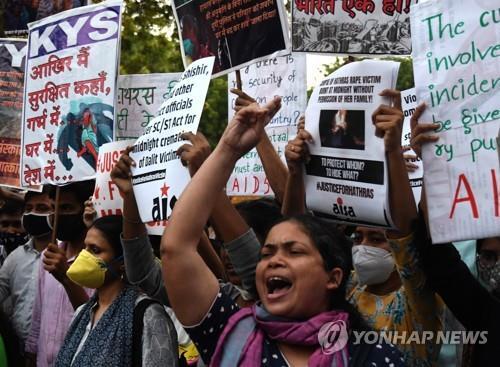
Protests in New Delhi, India over the case of sexual violence against women. Photo = Yonhap News
[아시아경제 김영은 기자] Controversy is arising after an Indian court ruled that a man who molested a girl was not considered sexual assault on the grounds that he did not take off his clothes.
CNN reported on the 26th (local time) that a man was convicted of sexual violence against a 12-year-old girl in Mumbai High Court for committing acts such as stuttering.
Judge Pushpa Ganediwala of the Supreme Court of Mumbai, India, said on the 19th that a 39-year-old man was not stripped of his clothes for sexual assault on the chest of a 12-year-old girl. Ruled. At the time, the judge said, “Because the case is serious, more rigorous evidence or serious charges are required,” and the judge sentenced him to one year in prison for only acknowledging sexual harassment charges instead of sexual violence.
According to court documents, the man appealed to the High Court after being sentenced to three years in prison in a lower court for trying to touch her breasts and remove underwear after taking the girl to his home in December 2016 for giving guava. .

Protests in New Delhi, India over the case of sexual violence against women. Photo = Yonhap News
However, as the law of India enacted in 2012 does not stipulate that a sexual violence crime is defined only when direct skin contact is made, voices criticizing the ruling are increasing as the news spreads around the social network service (SNS).
Indian Supreme Court Justice Karuna Noundi accused it of being “completely contrary to the law,” and insisted that “Judge Ganediwala should be retrained in basic rights.” “This ruling will ensure that crimes against girls are not punished,” she added.
Ranjana Kumari, director of a nonprofit social research center advocating for women’s rights in India, criticized the ruling as “shame, absurd, shocking, and lack of judicial prudence.”
Earlier in 2012, after a female college student was mass raped and murdered on a bus in New Delhi, India, the Indian government enacted a strict sex crime prevention law and voices to eradicate sexual violence are growing, but local women’s activists and foreign media argue that little has changed since.
In fact, crimes related to India have seldom declined. According to an announcement by the National Crime Records Bureau (NCRB), in 2019 alone, an average of 87 cases of sexual violence (a total of 34,000 cases) were reported per day in India. Every 16 minutes there was a crime of sexual violence.
This is an increase of more than 7% compared to 2018, and it is estimated that more cases are not reported. In addition, an annual crime report released by the Indian Ministry of Interior found that more than 85% of sexual violence cases were prosecuted, and only 27% were convicted.
Reporter Kim Young-eun [email protected]
